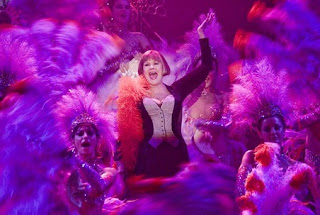
There is a scene at the beginning of Nine where Lilli (Judi Dench), a clothing designer (and confidante) for the famous film director Guido Contini (Daniel Day-Lewis) describes directing: "Directing a movie is a very overrated job, we all know it. You just have to say ‘yes’ and ‘no.’ What else do you do? Nothing. ‘Maestro should this be red?’ Yes. ‘Green?’ No. ‘More extras?’ Yes. More lipstick? No. Yes. No. Yes. No. Yes. No. That's directing.” One could say the same about critics – we say yes and we say no, and very often quite sternly.
Roger Ebert, a critic I often critique, gives Nine a very stern no. He begins his own critique stating: My problem may be that I know Fellini's "8½" (1963) too well. Indeed, this seems to be the case: Ebert, for the rest of his review, ignores the may in his beginning sentence, and goes on a rant of Nine’s ignorance of Fellini’s film. No, I haven’t seen it. And I have not seen the Broadway play either. I have a feeling that you haven’t seen either of them as well. So let’s throw out Roger Ebert because he’s a dinosaur.
A.O. Scott, the douchebag over at the New York Times, also seems confident in his no – and loudly. He screams: Ms. Ferguson stomp and gyrate through a number called “Be Italian,” which, like so much else in “Nine,” resembles a spread in a Victoria’s Secret catalog, only less tasteful. Ms. Hudson, for her part, struts through an embarrassing hymn to “Cinema Italiano” — with inane lyrics about “hip coffee bars” and Guido’s “neo-realism” — that recalls not Visconti or Antonioni (or even the Italian sex farces of the 1970s) but rather those lubricious Berlusconi-esque variety shows that baffle and titillate visitors from other countries who turn on their hotel-room television sets. Fergie’s “Be Italian,” is mean to be “less tasteful” – did you forget, Mr. Scott, that she’s playing a whore? “Cinema Italiano,” my favorite of the musical numbers, is not meant to recall Visconti or Antonioni.. Kate Hudson – who very much resembles her mother in one scene – is an American! You seem to have ignored her part as the American journalist, singing of what Americans want: hip coffee bars and neo-realism. Perhaps it is a reference to the naivity of American, but either way, you have overlooked the entire intent of this number.
The 37% rating over at Rotten Tomatoes is awfully misleading. Can a critic advise you not to trust critics? I enjoyed every second and every musical number of Nine. Daniel Day-Lewis gives yet another incredible performance as the exhausted – in mind and body – Italian film director. You can see it in his eyes and the slump of his body as he walks back toward his dinner (the one where he discusses the script he hasn’t written). Marion Cotillard, who stole my heart with her performance in La Vie En Rose, proves that she can do more than just lip-sync. Her every word poors out with such vigor, confidence, but a hint of her character’s suffering peeks through. The rest of the supporting cast is just as electrifying and beautiful – how can one NOT be in awe of a few of the greatest women in cinema on one stage?! And they’re singing and dancing! I bow down to the leading man of this film, but bow furhter to his female co-stars.
“So, please Guido, yes or no?” Yes, Lilli. Yes!


 When one explains the synopsis – It’s about an obese, black, illiterate, 16-year-old girl living in Harlem who is pregnant with her second child and at a middle-school level education – you can’t (or don’t) want to believe it. What you certainly can’t believe is that you would want to see such depressing material. But there is so much more to this film than a synopsis.
When one explains the synopsis – It’s about an obese, black, illiterate, 16-year-old girl living in Harlem who is pregnant with her second child and at a middle-school level education – you can’t (or don’t) want to believe it. What you certainly can’t believe is that you would want to see such depressing material. But there is so much more to this film than a synopsis.











